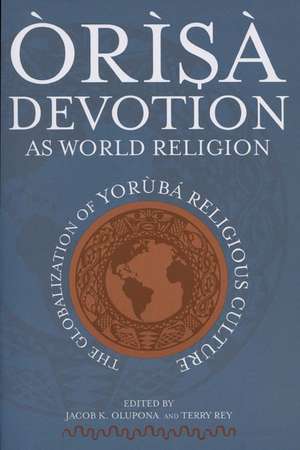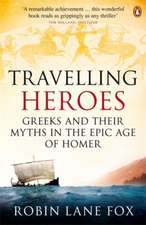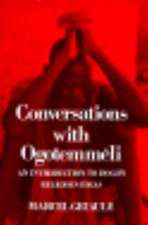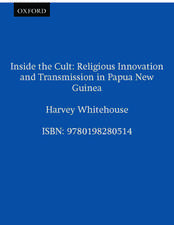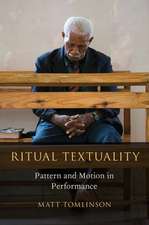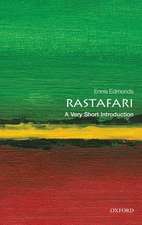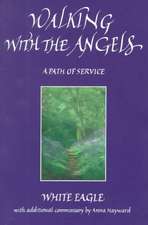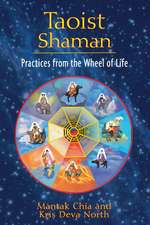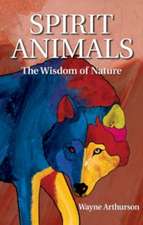Òrìsà Devotion as World Religion: The Globalization of Yorùbá Religious Culture
Editat de Jacob K. Olupona, Terry Reyen Limba Engleză Paperback – 9 mar 2008
As the twenty-first century begins, tens of millions of people participate in devotions to the spirits called Òrìsà. This book explores the emergence of Òrìsà devotion as a world religion, one of the most remarkable and compelling developments in the history of the human religious quest. Originating among the Yorùbá people of West Africa, the varied traditions that comprise Òrìsà devotion are today found in Africa, the Americas, Asia, Europe, and Australia.
The African spirit proved remarkably resilient in the face of the transatlantic slave trade, inspiring the perseverance of African religion wherever its adherents settled in the New World. Among the most significant manifestations of this spirit, Yorùbá religious culture persisted, adapted, and even flourished in the Americas, especially in Brazil and Cuba, where it thrives as Candomblé and Lukumi/Santería, respectively. After the end of slavery in the Americas, the free migrations of Latin American and African practitioners has further spread the religion to places like New York City and Miami. Thousands of African Americans have turned to the religion of their ancestors, as have many other spiritual seekers who are not themselves of African descent.
Ifá divination in Nigeria, Candomblé funerary chants in Brazil, the role of music in Yorùbá revivalism in the United States, gender and representational authority in Yorùbá religious culture—these are among the many subjects discussed here by experts from around the world. Approaching Òrìsà devotion from diverse vantage points, their collective effort makes this one of the most authoritative texts on Yorùbá religion and a groundbreaking book that heralds this rich, complex, and variegated tradition as one of the world’s great religions.
The African spirit proved remarkably resilient in the face of the transatlantic slave trade, inspiring the perseverance of African religion wherever its adherents settled in the New World. Among the most significant manifestations of this spirit, Yorùbá religious culture persisted, adapted, and even flourished in the Americas, especially in Brazil and Cuba, where it thrives as Candomblé and Lukumi/Santería, respectively. After the end of slavery in the Americas, the free migrations of Latin American and African practitioners has further spread the religion to places like New York City and Miami. Thousands of African Americans have turned to the religion of their ancestors, as have many other spiritual seekers who are not themselves of African descent.
Ifá divination in Nigeria, Candomblé funerary chants in Brazil, the role of music in Yorùbá revivalism in the United States, gender and representational authority in Yorùbá religious culture—these are among the many subjects discussed here by experts from around the world. Approaching Òrìsà devotion from diverse vantage points, their collective effort makes this one of the most authoritative texts on Yorùbá religion and a groundbreaking book that heralds this rich, complex, and variegated tradition as one of the world’s great religions.
Preț: 296.21 lei
Nou
Puncte Express: 444
Preț estimativ în valută:
56.68€ • 59.34$ • 46.90£
56.68€ • 59.34$ • 46.90£
Carte tipărită la comandă
Livrare economică 05-19 aprilie
Preluare comenzi: 021 569.72.76
Specificații
ISBN-13: 9780299224646
ISBN-10: 0299224643
Pagini: 592
Ilustrații: 14 b-w illus.
Dimensiuni: 152 x 229 x 36 mm
Greutate: 0.9 kg
Editura: University of Wisconsin Press
Colecția University of Wisconsin Press
ISBN-10: 0299224643
Pagini: 592
Ilustrații: 14 b-w illus.
Dimensiuni: 152 x 229 x 36 mm
Greutate: 0.9 kg
Editura: University of Wisconsin Press
Colecția University of Wisconsin Press
Recenzii
“Shaped by the transatlantic slave trade, Christianity, Islam, colonialism, and, now, globalization, Yorùbá religious culture remains dynamic and inspirational. This volume goes beyond the usual tendency in Diaspora studies to focus on cultural retention. It is a significant contribution.”— Mojúbàolú Olúfúnké Okome, Brooklyn College, City University of New York
“Contributes to a deeper and more sympathetic understanding of Yorùbá culture and religion and will be the definitive text for students, teachers, and practitioners of Òrìsà tradition for a long time.”—Akintunde E. Akinade, High Point University, North Carolina
“The editors have assembled contributions from great minds […] Highly recommended.”—Choice
“A tome of this size, bringing together studies by twenty-eight authors from four continents, around a set of contentious religious issues can only do justice to its subject matter by presenting a set of diverse and often conflicting viewpoints. What emerges is not a Nicene Creed but a portrait of a fractious, global, and growing religious tradition. Its leaders struggle for legitimacy, authenticity, and the authority to tell their history in ways that will help them reproduce their ritual communities. This book will be of interest to those immersed in these debates, but no reader should expect to agree with everything they find in its pages.”—Brian Brazeal, New West Indian Guide
Notă biografică
Jacob K. Olupona is professor of African religious traditions at Harvard Divinity School and professor of African and African American studies in the Faculty of Arts and Sciences, Harvard University. He is the author and editor of many books, including African Spirituality, Beyond Primitivism, and African Traditional Religions in Contemporary Society. Terry Rey is associate professor of religion at Temple University. He is the author of Our Lady of Class Struggle: The Cult of the Virgin Mary in Haiti and Bourdieu on Religion.
Descriere
As the twenty-first century begins, tens of millions of people participate in devotions to the spirits called Òrìsà. This book explores the emergence of Òrìsà devotion as a world religion, one of the most remarkable and compelling developments in the history of the human religious quest. Originating among the Yorùbá people of West Africa, the varied traditions that comprise Òrìsà devotion are today found in Africa, the Americas, Asia, Europe, and Australia.
The African spirit proved remarkably resilient in the face of the transatlantic slave trade, inspiring the perseverance of African religion wherever its adherents settled in the New World. Among the most significant manifestations of this spirit, Yorùbá religious culture persisted, adapted, and even flourished in the Americas, especially in Brazil and Cuba, where it thrives as Candomblé and Lukumi/Santería, respectively. After the end of slavery in the Americas, the free migrations of Latin American and African practitioners has further spread the religion to places like New York City and Miami. Thousands of African Americans have turned to the religion of their ancestors, as have many other spiritual seekers who are not themselves of African descent.
Ifá divination in Nigeria, Candomblé funerary chants in Brazil, the role of music in Yorùbá revivalism in the United States, gender and representational authority in Yorùbá religious culture—these are among the many subjects discussed here by experts from around the world. Approaching Òrìsà devotion from diverse vantage points, their collective effort makes this one of the most authoritative texts on Yorùbá religion and a groundbreaking book that heralds this rich, complex, and variegated tradition as one of the world’s great religions.
The African spirit proved remarkably resilient in the face of the transatlantic slave trade, inspiring the perseverance of African religion wherever its adherents settled in the New World. Among the most significant manifestations of this spirit, Yorùbá religious culture persisted, adapted, and even flourished in the Americas, especially in Brazil and Cuba, where it thrives as Candomblé and Lukumi/Santería, respectively. After the end of slavery in the Americas, the free migrations of Latin American and African practitioners has further spread the religion to places like New York City and Miami. Thousands of African Americans have turned to the religion of their ancestors, as have many other spiritual seekers who are not themselves of African descent.
Ifá divination in Nigeria, Candomblé funerary chants in Brazil, the role of music in Yorùbá revivalism in the United States, gender and representational authority in Yorùbá religious culture—these are among the many subjects discussed here by experts from around the world. Approaching Òrìsà devotion from diverse vantage points, their collective effort makes this one of the most authoritative texts on Yorùbá religion and a groundbreaking book that heralds this rich, complex, and variegated tradition as one of the world’s great religions.
